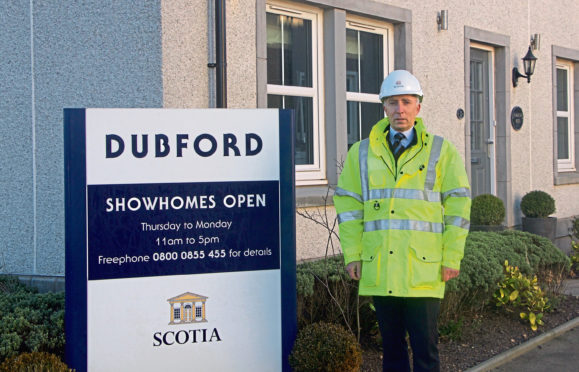Dundee-based property entrepreneur Bruce Linton has acquired a major Scottish housebuilder for an undisclosed sum.
Camlin Group, a joint venture between Mr Linton and Aviemore-based property developer David Cameron, has made a lockdown purchase of Ellon-headquartered Scotia Homes.
Scotia Homes, whose most recent accounts showed annual sales of almost £40 million, was founded in 1990 by Bill Bruce, who died in November.
It has developments in Forfar and Brechin in Angus as well as Aberdeen, Elgin, Ellon, Insch, Inverness, Kintore, Laurencekirk, Nairn, Newburgh and Peterhead.
Managing director of Scotia Homes Martin Bruce, who also has a shareholding, will remain in post as the company targets expansion.
He said: “David and Bruce have a huge amount of experience and knowledge of the property market in Scotland and notwithstanding the current exceptional circumstances, they decided to proceed with the acquisition of Scotia.
“It is reassuring that they are taking a medium to long term view of our business and we are delighted to have them onboard as our new owners.
“As well as their undoubted property experience and financial backing, David and Bruce will bring access to a landbank with planning consent across the Highland, Tayside and Angus regions of Scotland.
“This will enable the business to accelerate its geographic diversification and reduce its concentration risk to Aberdeen and the North East where the market is expected to remain challenging following the dramatic fall in oil and gas prices.”
Scotia’s latest accounts, for the year ending April 30, showed net assets of £28.7m, with no bank debt.
Among the prime industrial, retail and residential assets sold to Northern Inreland-based Lotus Property were Dundee’s West Marketgait mixed used development whose tenants include Travelodge, Pure Gym, Grosvenor Casinos and Tesco.
He was also one of the main owners of Piperdam Golf and Leisure Resort, which sold for £25m in 2016.
Mr Linton said: “I will look to grow the company quite aggressively in the Angus and Tayside areas and David Cameron will grow it in the north.
“It’s a strategic move by the both of us to capitalise on the opportunity of a very well run business.
“We are delighted that Martin is staying on as we’d really like to see the family connection stay with the company.”
Mr Bruce said he expected Covid-19 would impact the housebuilding sector and that confidence would be “fragile”.
He said Scotia was only now at the planning stage of recommencing construction across our various sites to ensure the ongoing safety of our staff, subcontractors and customers.
“It is extremely difficult to forecast the pattern of future sales and therefore our focus in the short term is to finish and handover those properties what are either pre-sold or nearing completion,” he added.
“Going forward, it will be necessary to right size the business to protect its long-term sustainability and this will be a major focus for us and our new owners as we adjust to the prevailing market conditions.”
rmclaren@thecourier.co.uk
